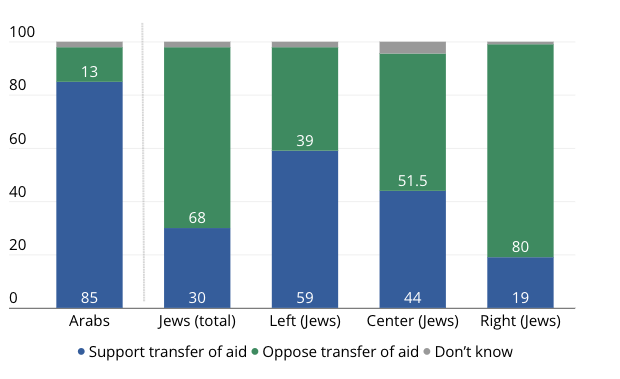[Depicted above is the Hebrew logo of the Israeli charity “Letate” (To Give), as part of the plea, “To give in a time of war.”]
When Israeli Defense Minister Yoav Gallant announced on April 7th that Israel would “flood Gaza with aid” by opening up a new crossing point from the north and taking other steps, it was heartening news to those who’ve been appalled that so many Gazans are desperately hungry, thirsty, sick and homeless because of the Israel-Hamas war.
Still, I’ve been haunted by evidence that most Israelis aren’t appalled. Pressure from the U.S. and the rest of international community is one reason why Israel is stepping up aid delivery, but there’s been almost no pressure within Israel itself. On the contrary, polls suggest that increasing humanitarian aid to Gaza is politically unpopular in Israel.
In an Israeli Democracy Institute (IDI) poll in mid-February, 68% of Israeli Jews said “no” when asked if they supported “the transfer of food and medicine to Gaza by international bodies that are not linked to Hamas or UNWRA.“ At that point, while conditions in Gaza were not as catastrophic as they are now, there was clearly a desperate need for food, water and medicine. Only about 30% supported this aid. The IDI got similar results when it asked the same question in several previous polls.
These answers were welcome fodder for people like the contributors to MondoWeiss, who hunger for material that shows Israeli Jews are brutal, evil and heartless. While I reject those characterizations, there’s no doubt that, for too many Israelis, the dehumanization and “othering” of Palestinians plays a role in their indifference to the plight of Gaza’s non-combatants.
“People didn’t want to know about the suffering of West Bank Palestinians,” said journalist Oren Persico in a webinar from Partners for Progressive Israel (PPI). “Now they don’t want to know about the suffering of people in Gaza.”

That is probably true of many who object to humanitarian aid. But others object for tactical reasons, believing more aid will reduce pressure on Hamas to release Israeli hostages. More generally, 66% of Israeli Jews told IDI pollsters in March that increasing humanitarian assistance will “weaken Israel’s bargaining power” in negotiations with Hamas. “As long as Hamas holds hostages, there will be little empathy or concern about humanitarian aid,” said Tamar Hermann, IDI’s pollster.
One oft-used explanation for Israelis’ lack of concern for Palestinian suffering is that it hasn’t gotten much attention in the Israeli media. That is partly because Israelis are still reeling from Hamas’ heinous attack on October 7th. There are many other urgent concerns that garner media coverage, including the hostages’ plight, the fate of Israelis displaced from the Gaza border and northern Israel, the ongoing war in Gaza, and now, of course, the question of how to respond to the recent attack from Iran. When Israeli media do cover conditions in Gaza, Persico said, “you see rubble, you see streets that are now dust, but you don’t see people…. There is a huge catastrophe going on that the Israeli public knows nothing about.”
Persico said that on March 28th, but since then there has been at least a bit more public awareness of Gaza’s humanitarian crisis, especially after the IDF mistakenly killed World Central Kitchen staffers and volunteers on April 1st. That tragic incident “was covered for a week on Israeli news,” said Shachar Zahavi, the Israeli head of the Smartaid relief organization, in a webinar from Americans for Peace Now. As a result, he thinks Gazans’ desperate need for help “has begun to sink in.”
But the willingness to ignore or not give a damn about the dire straits of Gazan civilians is still troubling. 88% of Jewish respondents said no when the IDI asked, “Should we take the suffering of Palestinians into account for operational planning purposes during the Gaza war?” About 17% said yes, as did most Israeli Arabs. In other words, while Israel’s spokespeople and other defenders spend a lot of time showing how the IDF tries to minimize the suffering and deaths of non-combatants, most Israeli Jews think it’s not worth the effort.
Can progressives who care about the survival and well-being of both Israelis and Palestinians find any solace in this situation? Yes, a little.
In March, five Israeli human rights groups filed a petition to Israel’s Supreme Court asking for an expansion of humanitarian aid and criticizing Israel’s efforts thus far. A three-judge panel took those claims seriously in a hearing on April 5th and asked the Israeli government tough questions about its aid efforts. Several judges characterized those efforts as inadequate. It remains to be seen whether that will make any difference on the ground.
Another glimmer of hope: one Israeli NGO, Zahavi’s group, SmartAID, has worked with partner organizations to provide much-needed tents to displaced Gazans. It is now planning to arrange the delivery of wheat and other food. When they announced this for the first time in an article in eJewish Philanthropy on April 17th, Zahavi said, “a hundred people” immediately got in touch and offered contributions. Some were Israeli.
Most importantly, IDI’s poll in February asserted that there was support for more humanitarian aid from 59% of Israeli Jewish leftists but also 44% of centrists. Add in support from 85% of Israeli Arab respondents, and there is clearly a tangible constituency that wants to help Gazans.
This constituency is currently disempowered, but that could change if Netanyahu is forced out of power, which is a distinct possibility. At some point, once we get to the so-called “Day After” the Israel-Hamas war, rebuilding the Gaza Strip and rehabilitating the lives of its residents will become a priority for the international community. Despite inevitable squawking from the far right, there’s a chance it will also become a higher priority for Israelis. Tragically, that might not happen soon enough for Gazans on the verge of starvation right now.
Dan Fleshler